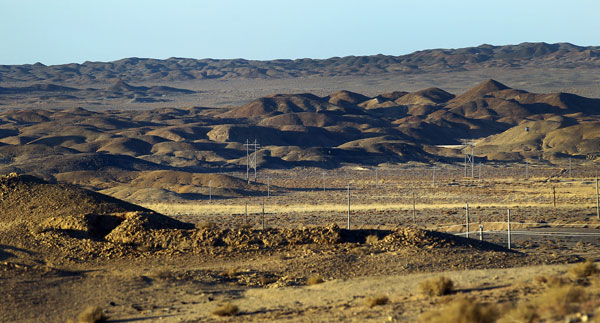Editor's note: This is the sixth in a regular series of reports brought together under the banner "Lost Horizons", which aim to show life in the less-reported areas of the country and to give a voice to those whose words often go unheard. Slideshows and video footage are also available at www.sdlsmy.com/video
More lucrative pastures lure herdsmen from the traditional Gobi lifestyle, reports Cui Jia.
After hours of driving through Gansu province, following the modern highway that runs alongside the remains of ancient walls and watchtowers made out of gravel and soil, the surroundings suddenly changed when we took the exit to Mazongshan - one of the least populated towns in China.
Almost without warning, the landscape switched from the yellow silt of the Loess Plateau to the black sands of the Gobi desert.
Mazongshan, which translates into English as "Horse Mane Mountain", occupies a unique spot in the ageless Gobi. Numerous small black hills are scattered across the vast, arid spaces paved with flat, black stones that shine dully in the broiling sun. Long ago, travelers on the only road leading into the town decided that the cascading hills resemble the flowing manes of wild horses, and the name stuck.
Linking the Xinjiang Uygur autonomous region with the Inner Mongolia autonomous region and Mongolia, the town was once an important gateway on the Silk Road, the ancient caravan route used by merchants in times long past. Situated in Gansu's far northern corner, Mazongshan covers an area of more than 38,000 square kilometers, making it approximately equal in size to Jiangsu province. However, the population is a mere 1,420, according to recent statistics from the local government.
During the bone-shaking ride along the bumpy road that cuts through the lifeless black desert to the town center, the landscape resembles that of another planet. No maps of the town exist because they are unnecessary. Mazongshan consists of just two streets, a statue of an ibex - a type of wild goat - stands at the intersection. The Gobi is a prime natural habitat for animals such as ibex, wild horses and camels. The profusion of wildlife saw Mazongshan open one of Gansu's three official international hunting grounds in 1988.
 |
|
The view overlooking Mazongshan in Gansu province, with small black hills scattered across vast arid areas, resembling a horse's mane. Photos by Zou Hong / China Daily |
Related:
'One day, wolves may attack humans'
Bitter winter blast hits the south hard
Taxi shortage means passengers are fare game
Li pledges measures in fight for clean air
